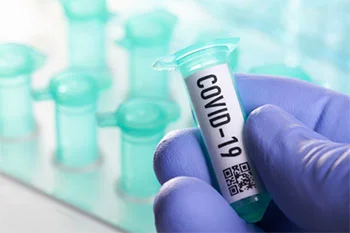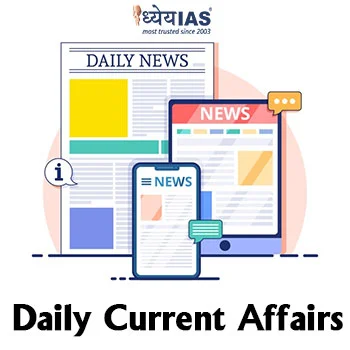Daily Current Affairs for UPSC, IAS, UPPSC/UPPCS, BPSC, MPPSC, RPSC and All State PCS Examinations
Jal Jeevan Mission
Why in News ?
Recently, Jal Shakti Ministry showed that there had been a 45% shortfall in financing the Jal Jeevan Mission(JJM) by both the Centre and the States in its first year of 2019-20, along with emerging pandemic challenges. Ministry is pitching for additional funding of ₹82,000 crore from the 15th Finance Commission for the project. Thus, Jal Shakti Ministry wants control of finance panel’s panchayat grants for water, sanitation to merge with JJM.

Jal Jeevan Mission
- The chief objective of the Mission is to supply of 55 litres of water per person per day to every rural household(Har Ghar Jal) through Functional Household Tap Connections (FHTC) by 2024.
- It aims to create local infrastructure for source sustainability measures as mandatory elements, like rainwater harvesting, groundwater recharge and management of household wastewater for reuse in agriculture.
- It will cover other Central and State Government Schemes to achieve its objectives of sustainable water supply management and fund sharing pattern between the Centre and states is 90:10 for Himalayan and North- astern States, 50:50 for other states, and 100% for Union Territories.
Significance
- There is an urgent requirement of water conservation in the country because of the decreasing amount of groundwater level.
- Depleting groundwater level, overexploitation and deteriorating water quality, climate change, etc. are major challenges in providing potable drinking water.
- Thus, JJM will focus on integrated demand and supply management of water at the local level.
Finance Commission
- Article 280 of the Constitution of India provides for a quasi-judicial body, the Finance Commission.
- It was formed to define the financial relations between the central government of India and the individual state governments.
- It is constituted by the President of India(1st in 1951) every fifth year or at such earlier time as he considers necessary.
- The recommendations made by the Finance Commission are only advisory in nature and hence, not binding on the government.
- The 15th Finance commission makes recommendations for the period of 2020-2025 (5 years).
- Constituted by the President in November 2017
- It is headed(chairman) by N K Singh.
- Deliberation period is from end of 2017 to end of October 2019.
COVID Status and Healthcare Facility in "Aspirational" Districts
In News
- Government reviewed the COVID status and healthcare facility in "Aspirational" districts with special focus on North East.
- Government disclosed that in the wake of COVID pandemic, the Ministry of North East (DoNER) has decided to sanction Rs.190 crore for augmentation of healthcare facility in the eight North Eastern States, particularly for developing infrastructure for management of infectious diseases.

About
- "Aspirational" Districts focuses closely on improving people’s ability to participate fully in the burgeoning economy. Health & Nutrition, Education, Agriculture & Water Resources, Financial Inclusion & Skill Development, and Basic Infrastructure are this programme’s core areas of focus.
- Each Aspirational District was to focus on improving these key indicators and raise its rating viz-a-viz the best performing district of the State and the best performing district of the country in the given indicators.
- The broad contours of the programme are Convergence (of Central & State Schemes), Collaboration (of Central, State level ‘Prabhari’ Officers & District Collectors), and Competition among districts driven by a mass movement.
Purpose
- The Aspirational Districts Programme is a step towards the development and growth of some of this country’s most ignored populations. It directs and focuses resources and action towards the districts identified as the most disadvantaged.
- The programme is an attempt to combine a host of governance innovations to improve accountability through monitoring, convergence through concerted action and ownership through public ranking.
Achievement
- Government also complemented the Aspirational Districts of Goalpara and Dhubri in Assam for having achieved Ayushman Bharat coverage of nearly 100% and 85% respectively.
Conclusion
- The programme is in its early days yet, but progress is good and signs for the future are hopeful. Committed and concerted action will be required from all those involved, from the Centre to the State to the district to the village, Through this programme, the government hopes to deliver on the promise of better, freer lives for every citizen of this country.
Prelims Practice Question
Q1. Which of the following is not one of the key interventions under the Jal Jeevan Mission ?
a. Bore well recharge structures
b. Micro irrigation technologies
c. Water conservation and rainwater harvesting
d. Renovation of traditional and other water bodies
Answer : B
Explanation: JJM aims to create local infrastructure for source sustainability measures as mandatory elements, like rainwater harvesting, groundwater recharge and management of household wastewater for reuse in agriculture.
Q2. Consider the following statement and choose the correct statement-
A.) "Aspirational" Districts focuses closely on improving
people’s ability to participate fully in the burgeoning economy. Core focus
areas are Health & Nutrition, Education only.
B.) Aspirational Districts of Goalpara and Dhubri in Assam achieved Ayushman
Bharat coverage of nearly 100% and 85% respectively.
Options-
1. A only
2. B only
3. A and B
4. None of the above
Answer- 2
Explanation- "Aspirational" Districts focuses
closely on improving people’s ability to participate fully in the burgeoning
economy. Health & Nutrition, Education, Agriculture & Water Resources,
Financial Inclusion & Skill Development, and Basic Infrastructure are this
programme’s core areas of focus. Aspirational Districts of Goalpara and
Dhubri in Assam for having achieved Ayushman Bharat coverage of nearly 100%
and 85% respectively.







